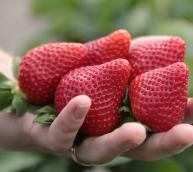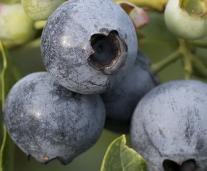Small Fruits


Fruit crops are of great economic importance to Florida—the farm gate value of major fruit crops is over $2 billion. We conduct economic research production and marketing areas to help the industry address increasing threats and challenges from labor shortage, domestic regulation, and international competition.
All UF/IFAS cultivars are developed through traditional breeding methods and are not genetically engineered. The GCREC develops strawberry and blueberry cultivars for the Florida industry, and commercial production is concentrated on more than 11,000 acres in west-central Florida. Criteria for selection include: High marketable yields, especially in the early season; excellent fruit appearance, size and shelf life under harsh environmental conditions; consistently sweet flavor; and resistance to multiple diseases of economic importance.
The small fruit entomology program focuses on identifying and managing pests, such as spider mites and thrips, using chemical, cultural, and biological methods. The program works with growers and industry members to develop integrated management strategies that rely on proper pest identification, the cautious use of insecticides, and biological controls when possible. Insecticide resistance management through rotating modes of action is emphasized.
Strawberry and blueberry the two most important non-citrus fruit crops in the state of Florida, generating hundreds of millions of dollars in revenue, tens of thousands of jobs and marketing opportunities for both industries. Other emerging fruit crops include blackberry, peach and pomegranate. The horticultural fruit crop program develops science-based information on irrigation, fertilization, and crop management of all the crops aimed to fellow scientists, growers and the general public. Strawberries are one of the most valuable crops in Florida and diseases are one of the major limiting factors of marketable yield. The main focus of the strawberry pathology program is to conduct basic and applied research on important diseases affecting strawberry production in Florida. Changes in government regulations, consumer preferences, and cultural practices make it imperative that new programs be developed to improve disease control and optimize fungicide use in strawberry production. Results of our research are extended to commercial growers, extension agents, industry personnel, and other scientists.
The goal of the Weed Science Program is the development of effective integrated weed management plans for small fruit growers. An overall systems approach to weed management is emphasized that includes the safe and effective use of fumigants and herbicides in combination with biological knowledge, crop rotation, fallow programs, and cultivation. The impact of weeds on diseases, insects, nematodes as well as fruit yield and quality is an important component of the research and is enhanced by collaborative interactions with other UF scientists and colleagues.
